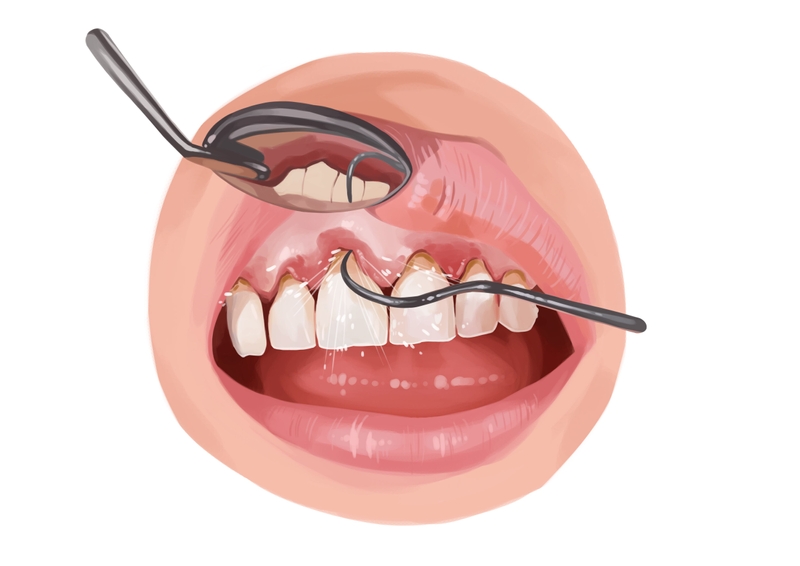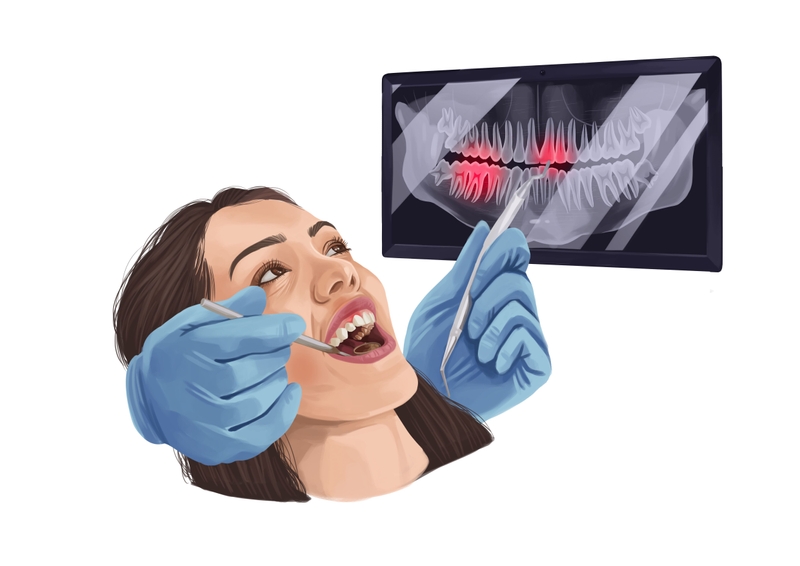- Gum disease begins as gingivitis and can develop into periodontitis. It first affects the gums, but then can also damage the jawbone and lead to tooth loss.
- Symptoms of gum disease include bleeding, inflamed and receding gums. It can also lead to bad breath, sensitivity, painful chewing and deep pockets around the teeth.
- Plaque and tartar, which form due to poor oral hygiene, are the main cause of gum disease. Treatment requires deep cleaning, scaling and root planing, antibiotics, and in extreme cases, surgery.
Need emergency treatment for a gum disease? Find urgent care dental near you with Authority Dental.
Do you have any signs of gum disease? Here's everything you need to know.
Gingivitis vs. periodontitis

Picture by Authority Dental under CC 2.0 license
Gingivitis and periodontitis are 2 stages of gum disease.
Gingivitis is the initial stage of gum disease and acts as a warning sign. Gums around the teeth are inflamed. Once this travels below the gumline into the bone, the gingiva starts to shrink and recede away from the teeth. The surrounding structures are likely to get damaged.
Periodontitis occurs when gum pockets are deeper than 4mm. When the attachment of gums and teeth starts to dissipate, periodontal pockets form. There, bacteria set up habitat and multiply, causing significant inflammation. These pockets, once formed, are very hard to clean. It often has to be done professionally and with use of antibiotics.
Despite the seemingly clear differences in the severity of symptoms, it is difficult for patients to independently judge their stage of gum disease. It is best to go to a dental professional who will do an exam and measure the depth of the pockets. If you notice disturbing signs, do not delay the visit so as not to allow the disease to develop.
Gum disease symptoms
The most common signs of gum disease include:
bleeding gums, especially after brushing or flossing,
red, swollen, tender, and receding gingiva,
persistent foul taste,
sensitivity to hot and cold temperatures,
painful chewing,
presence of pus in the mouth,
deep pockets around the teeth,
loose dentition, and
changes in the bite.
You’ll have bad breath as the bacteria present in the mouth will release toxins. However, this is only apparent with gum disease. Your breath should stay about the same if you only have gingivitis.
When you have receding gums, your teeth will appear longer. This happens due to loss of tissue. What’s more, teeth then start to shift and move as they have less support from the bone.
Sensitivity is also associated with gum recession. The sensitive parts of the teeth (that are not covered by enamel) become exposed. The disease will attack these more vulnerable parts of your dentition.
These periodontitis symptoms might only affect some teeth, for example molars. That makes them harder to spot.
Sometimes there are no symptoms of gum disease, but the problem is still at hand. It may be that even advanced stages don’t give you as much as a warning sign. That’s why regular dentist visits are so important.
What causes gum disease?

Picture by Authority Dental under CC 2.0 license
The biggest culprit here is plaque and tartar buildup. This is usually the result of poor oral hygiene that lacks brushing, flossing, and regular dental cleanings.
Some patients may be more susceptible to the disease, however. This is linked to several factors, which can make teeth and gums sensitive, leading to quicker and increasingly aggressive progression.
Hormonal changes
These often occur during pregnancy, menopause, and menstruation. Puberty is also a dangerous time for mouth and gum health, as gum disease incidence rates are much higher for 15-18 years olds.
Certain illnesses
Illnesses that affect periodontitis are primarily those that attack the immune system. They include cancer, HIV, and diabetes. Treatment for those can make periodontitis even more of a risk.
Some medications
Spit is an important part of disinfecting and protecting the teeth, gums, and the mouth. Saliva flow is reduced by many medications. The most prominent among them are anticonvulsant, anti-angina, antihistamine, and antidepressant drugs. You may even develop a condition called dry mouth.
Lifestyle
Poor lifestyle choices such as smoking, alcohol abuse, and high stress levels also contribute to periodontitis. Dip gum disease, caused by chewing tobacco, is arguably the most direct of periodontitis causing factors. Habits like mouth breathing also make it easier for bacteria to enter the gum cavity.
Family history of the disease
Family history as well as previous incidence can make you more susceptible to getting gum disease again. Many dentists refer to chronic periodontitis treatment as “maintenance” because of its tendency to come back.
Crooked or overlapping dentition
Orthodontic problems can make teeth harder to clean properly. Plaque loves to take habitat in those nooks and crannies that your toothbrush just can’t reach. If you find that this is true in your case, visit an orthodontist.
Poor nutrition
And lastly, watch your diet for high sugar and carbohydrate content. Those substances like to simmer in the mouth long after the meal is gone. Deficiency in Vitamins C and D also make healing slower.
Gum disease treatment
As soon as you are diagnosed with gum disease, it's best to take action right away to minimize consequences. Still, there is no magic periodontitis cure, it is rather a process.
Periodontitis remedies from home
Since periodontitis is often the result of poor oral hygiene, proper brushing and flossing is key. If your gums and teeth are tender, use a soft-bristled brush and go easy on your mouth. Invest in antiseptic mouthwash to reduce the number of bacteria as well. You can use hydrogen peroxide as a rinse as well.
Tobacco makes it much harder for your mouth to fight bacteria. Dip and cigarettes are an absolute no-no once you start treatment. Some dentists may even refuse to work with you until you target this issue.
A well-balanced diet can boost your body’s ability to fight off infection. Antioxidants like ones found in vegetable oils, nuts, and greens can help repair damaged tissue.
And lastly, when your teeth start to feel loose or shift, grinding and clenching can cause this issue to get worse. The teeth may even fall out.
Professional gum disease treatment
Whatever the stage, we recommend a checkup with your dentist, or better yet, a periodontist. He or she will conduct an exam to look for the following signs of gum disease:
pocket depth,
bleeding and swelling of the gums,
tooth movement and sensitivity, and
bone structure quality.
The last step is going to be done with X-rays. If the dentist concludes that you are in fact suffering from gum disease, he or she will perform a deep cleaning, otherwise referred to as scaling and root planing.
A deep cleaning happens both above and below the gumline. Scaling involves scraping off tartar deposits. Root planing means polishing and smoothing the surfaces of exposed roots. You might get time-release antibiotics and have to return after a few weeks.
If your gums suffered significant damage, you may need periodontitis gingivoplasty. It is a surgical reshaping of gum tissue that has been lost due to the disease.
FAQ
Does gum disease go away when teeth are removed?
Is Alzheimer's gum disease a thing?
How to prevent gum disease?
Proper plaque control is key. Gum disease can be managed and even reversed this way. This means brushing after every meal, flossing every day, and coming in for a professional cleaning at least twice a year.
Antibacterial mouthwashes are great at reaching places you miss during your oral routine. Soft areas like your gums may be too sensitive for brushing, so managing bacterial growth with rinses is important.
How long does it take for gingivitis to turn into periodontitis?
References
- Effects of scaling and root planing on clinical parameters and bacterial flora in periodontal pockets
- What is the difference between plaque and calculus?
- Aggressive periodontitis: case definition and diagnostic criteria
- Differences in periodontal disease-associated microorganisms of subgingival plaque in prepubertal, pubertal and postpubertal children
- The role of immune system in the development of periodontal disease: a brief review
- Salivary flow rate and periodontal infection - a study among subjects aged 75 years or older
- The Relationship between Vitamin C and Periodontal Diseases: A Systematic Review
- Evaluation of the effect of hydrogen peroxide as a mouthwash in comparison with chlorhexidine in chronic periodontitis patients: A clinical study
Nichole McKenna, DDS
If unable to stop clenching or grinding on your own, you may benefit from an oral appliance, such as a nightguard.